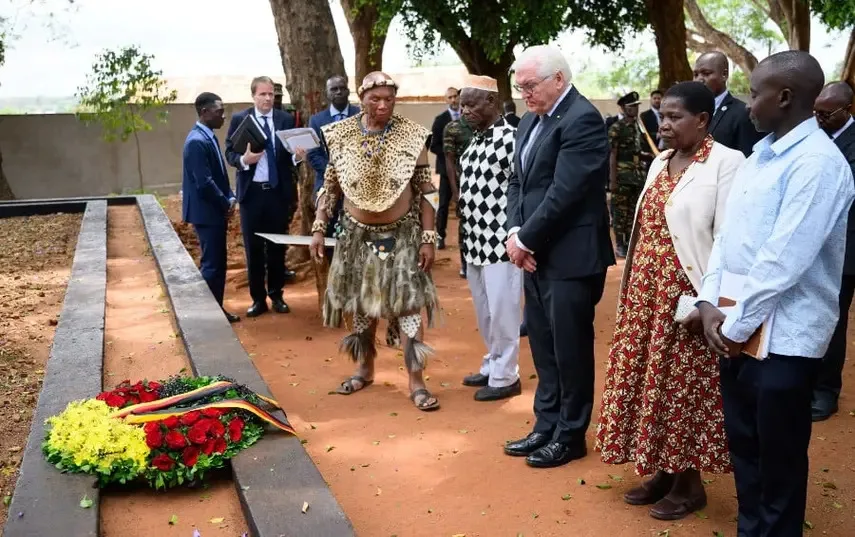The German President, Frank-Walter Steinmeier, issued a formal apology in Tanzania for the past looting and colonial-era atrocities. German forces committed these crimes, especially during the Maji Maji rebellion in the early 1900s. The rebellion, which occurred in what is now Tanzania, resulted in the deaths of nearly 300,000 people. This makes it one of the bloodiest anti-colonial uprisings in history.

Speaking at the Maji Maji Museum in Songea, President Steinmeier expressed deep remorse.
“As German President, I would like to ask for forgiveness for what Germans did to your ancestors here. This cruel deed has left its mark on many generations.”
Steinmeier, who began a three-day visit to Tanzania told descendants of local war hero Songea Mbano
He acknowledged the shared history between Tanzania and Germany, emphasizing the need for understanding and reconciliation.
During the visit, President Steinmeier met the descendants of Chief Songea Mbano. In 1906, authorities executed Mbano, the local hero of the Maji Maji rebellion. Steinmeier promised to help locate his remains, possibly transported to Europe by German troops for burial. He acknowledged human remains in German museums and emphasized the joint effort to address the issue.

“It shames me. I am ashamed about what German colonial soldiers did to your forefather and his fellow warriors,” he added, but made no mention of reparations.
President Steinmeier’s visit to Tanzania and his apology signify a step towards acknowledging historical injustices and fostering cooperation between the two countries. However, some Tanzanians have called for reparations, highlighting the complexity of addressing the consequences of colonialism. Germany’s efforts to recognize and take responsibility for its colonial past continue to unfold, reflecting a broader global conversation about historical accountability and reconciliation.

History of colonial crimes and looting
In the late 19th and early 20th centuries, German colonial forces engaged in several brutal campaigns in Africa. This included Tanganyika, now present-day Tanzania, first a German colony before coming under British control in 1919. These campaigns were further marked by violence, forced labour, and exploitation of local resources. Additionally, German colonial officials engaged in the looting and appropriation of cultural artifacts, including art, from the indigenous peoples of these regions.
During this period, German colonial authorities plundered significant cultural and artistic treasures from Tanzania, stripping local communities of their heritage. Germany seized and shipped back artifacts, sculptures, masks, and other culturally significant items. In addition, museums, private collections, and anthropological researchers displayed them. The looting of these artworks stripped the communities of their cultural identity, history and heritage.
In the aftermath of the Maji Maji rebellion which occurred between 1905 and 1907, colonial authorities looted valuable artifacts and cultural objects from the affected communities. This further exacerbated the devastation caused by the conflict.
The looted artworks, taken without consent or compensation, represent a dark chapter in German colonial history. It reflects the exploitation and dehumanization of the indigenous peoples of Tanzania. Hopes abound for increased efforts to address historical injustices and repatriate stolen artifacts to their countries of origin.

